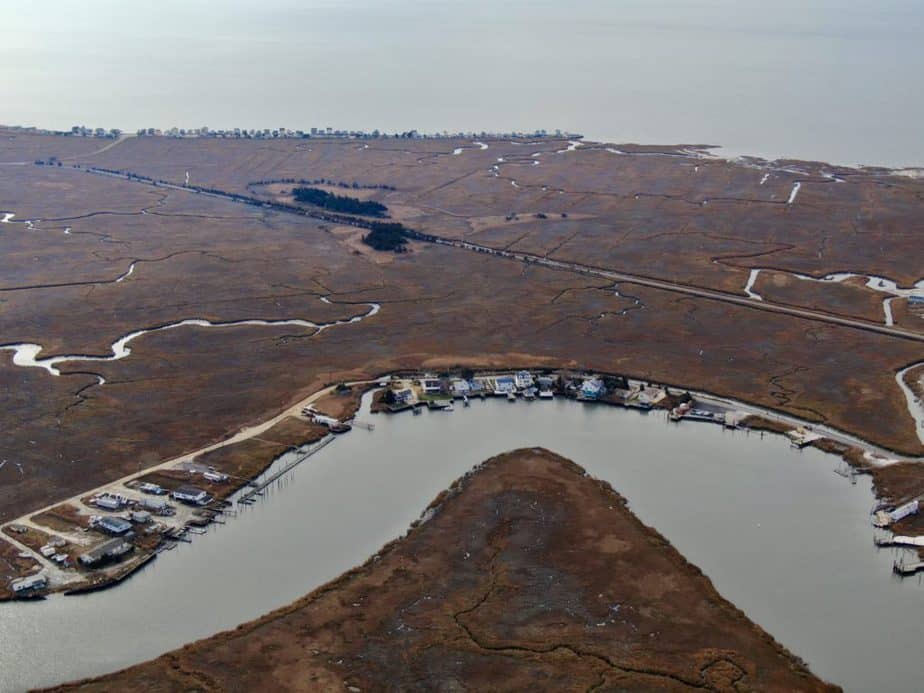Class and Conservation
Climate change and the threat of sea-level rise and storm damage will almost certainly widen the gap between those with privilege and those with less. Economic class does matter in resource protection. The sad fate of Money Island tells us how.
Money Island nestles in broads curves of the Nantuxent Creek, NJ, a small intertidal waterway emptying into Delaware Bay. If the residents were wealthy, it might be considered choice property, nestled along a beautiful waterway in a relatively unsettled landscape in South NJ. It’s less than an hour from the rich suburbs of Philadelphia and Wilmington. Natural bounty truly abounds. If Money Island occupied a similar place on the Atlantic Coast, money would flow to protect it.
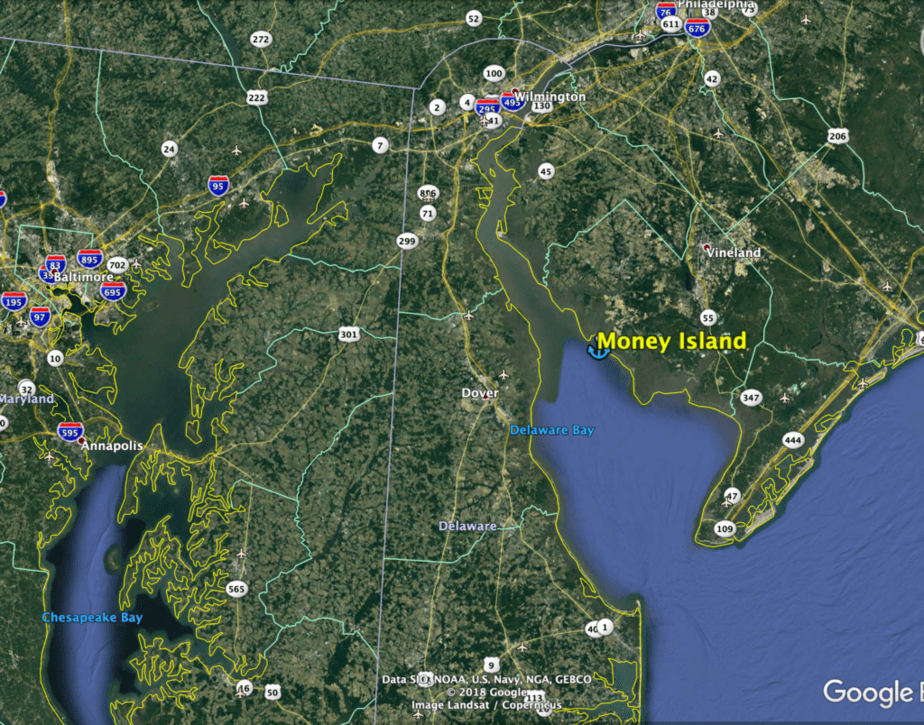
This google earth image shows the location of Money Island, NJ on Delaware Bay. The town lies within a 50-mile distance of Baltimore – Wilmington -Philadelphia area.
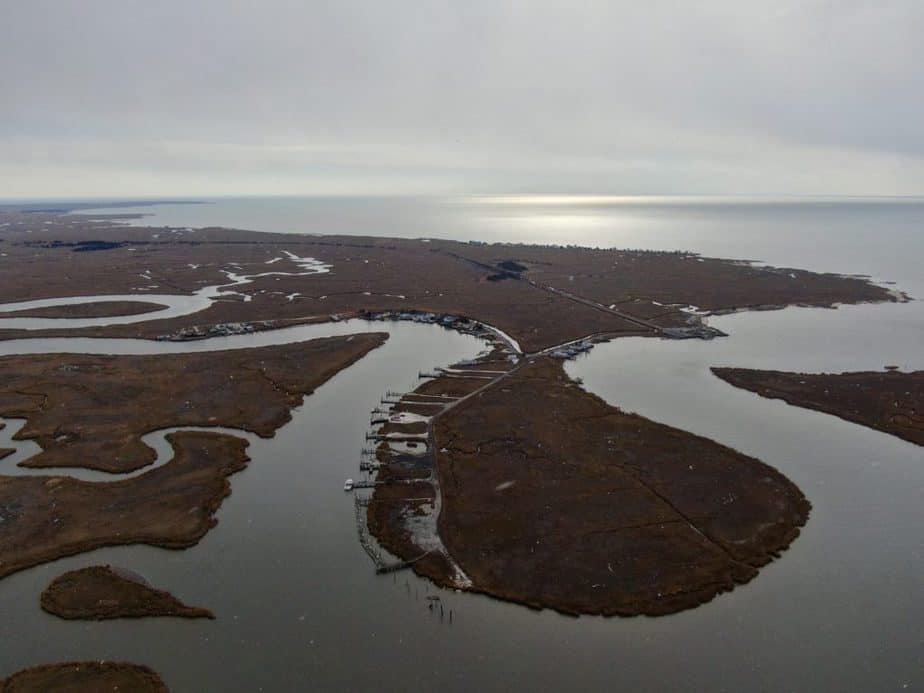
An aerial view of Money Island. The Nantuxent Creek flows around the town and into the Delaware Bay.
Violations and Buy-Outs
But it’s not wealthy, and the government intends to abandon it. Over the last few years, the NJ state Land Use Program cited residents with notices of violation. Many of the offenses, like eroded bulkheads or deficient septic tanks, predated the residents served the notices. If left to accrue these violations with their accompanying fines would panic most of us.
To the agency’s credit, the state’s Blue Acres program, a state land acquisition agency meant to help people exactly in this situation, made offers. Who could refuse? The beleaguered residents live on the edge of safety. Hurricane Sandy almost did them in for good. Most eke out a hard-working living and could barely afford the required repairs even if their neighbors agreed, and the costs could be shared. In another state, the government might have helped people stay.
Instead, Blue Acres offered to buy them out. Offering only a percentage of the appraised value, the agency provided residents with a way out but not to a new life equal to that lost. Many of these people lived or vacationed in these houses for decades. Leaving a working-class waterfront home amid natural beauty, for a new home equal to the buyout price offered by the Blue Acres would make anyone’s heart sink. The money might have been fair, but it could not replace what’s was lost.
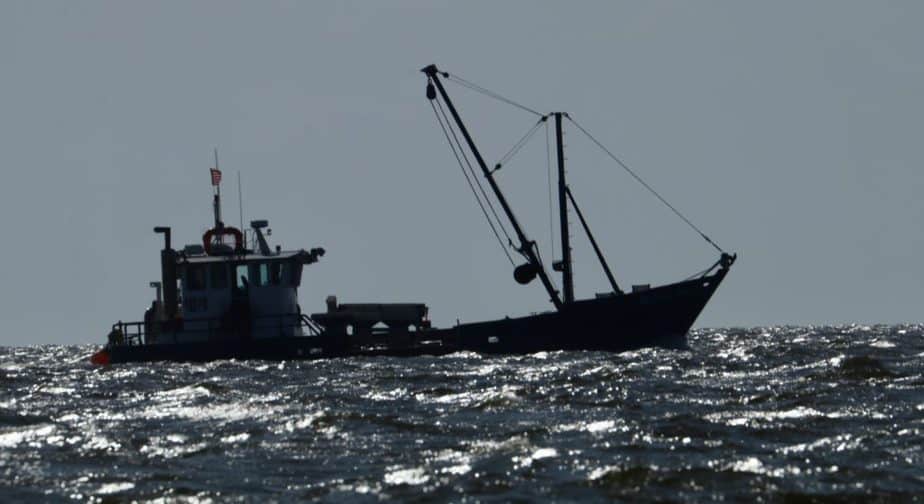
An oyster boat braves the shoals at the mouth of the Maurice River. Oystermen have suffered more than any other commercial activity from the lack of state support, from everything from cheap dock space to the replenishment of shell on the oyster grounds.
Losing out
But what will happen to the small fleet of oyster boats tied to the ramshackle docks lining the intertidal waterway? Without government support they will ultimately have to find a new home, but where? The Delaware Bay’s oyster grounds center outside the Nantuxent Creek. All other places will almost certainly be more expensive. For a shellfishery on its knees from disease and lack of support from the state, the alternatives winnow out quickly.
In the Chesapeake, the state of Maryland supports small boat commercial fishers by supplying cheap or free dock space at state marinas. It’s a statement – we support the local fishery. This possibility never entered the choices made about Money Island.

A blue crab fishing boat docked at a state-owned Chesapeake Bay dock. The state subsidizes small fishermen by providing low-cost dockage.
No access
The few remaining marinas in Money Island struggle to exist against depleted fisheries, a direct outcome of state and federal mismanagement of the bay’s once-abundant fishery. What will happen to them when all the residents leave? How will recreational boaters, birders, kayakers, and other outdoor enthusiasts enjoy the area if they have no access to the water? Other states will create well functioning boat ramps. One look at the state boat ramp in Fortescue tells all.
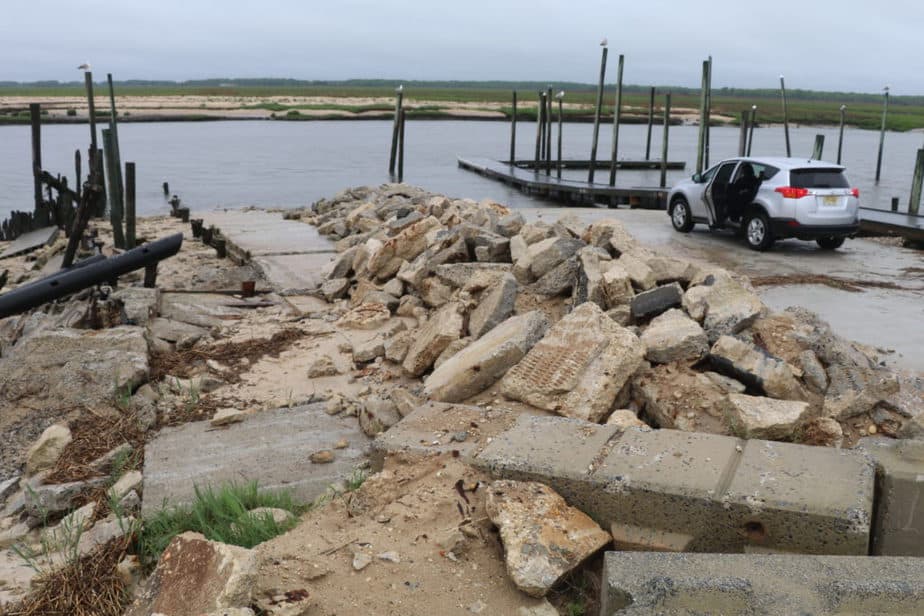
The Parks and Forestry Boat Ramp in Fortescue NJ. The local Captains Association placed the rubble on the bayside to help boaters avoid the steep wind-driven waves coming in from the bay. The state required it to be taken out to stop the destruction of horseshoe crabs dying trapped in the rubble. Today the bay threatens boaters once again.
Its this way throughout the bay, not just Money island. Nautical folks who love the natural world -fishers, hunters, birders, kayakers – all must fend for themselves to find access. The NJ government undermines this access and service by providing little incentive for communities of Delaware Bayshore to persist. Keep in mind the communities rim the southern edge of Cumberland County, the poorest in the state. Adjacent portions of Salem County and even western Cape May County are in a similar economic condition.
Contrast this with Maryland’s portion of the Cheasapeake Bay, where agencies treat commercial docks as a public resource, a foundational heritage that defines the character of the bay.
Not so in NJ. It seems the agencies have made a deliberate policy choice to pave the way for residents, oystermen, sport fishers all, to find a new life in some other place or another state.
A drone view of the Money Island waterfront.
Garbled Policy
In reality, state agencies have two minds about this. One Department recognizes the natural value of the bay and sees moving people out as both benevolent and ecologically beneficial. Other Departments see supporting rural communities as a way to create access to recreation and the businesses that depend upon it. But I doubt there is a consensus.
In other words, whatever policy exists, it’s garbled and not shared openly with the people who live on Delaware Bayshore. The agencies create no broad-based discussions that include the people most affected by the policy’s outcome. They only get to see the result. The government adding a new threat to all the others facing Bayshore residents, as they cling to their homes.
This threat would be unfamiliar to most people living along the Atlantic Coast marsh, let along one of our fabulous resort towns. Federal, state, or rich local governments would create the funds necessary to innovate resilancy. Class matters in conservation.

